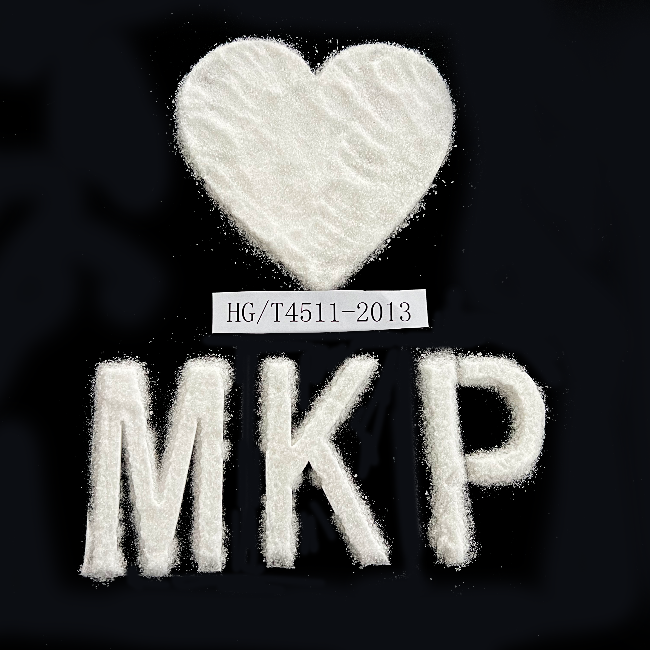Detailed explanation of industrial grade potassium dihydrogen phosphate (MKP)

Industrial Grade Monopotassium Phosphate (MKP) Overview
Monopotassium Phosphate (MKP), with its superior chemical properties and versatility, is widely used in various industrial applications. As a high-purity inorganic compound, it plays a crucial role in agriculture, chemical manufacturing, food processing, water treatment, and other industries. Below is a comprehensive overview of MKP's features and industrial applications.
1. Product Description
Chemical Formula: KH₂PO₄
Molecular Weight: 136.09 g/mol
CAS Number: 7778-77-0
Appearance: White or colorless crystalline powder
Purity: Typically ≥98% for industrial grade
Solubility: Highly soluble in water, forming a mildly acidic solution
MKP is a product of the neutralization reaction between phosphoric acid and potassium hydroxide. It serves as an excellent source of potassium and phosphorus, both essential elements for various industrial and agricultural processes.
2. Physical Properties
Appearance: White crystalline or granular powder
Solubility: Easily soluble in water (22.6 g/100 mL at 20°C), insoluble in alcohol
pH: 4.3–4.7 for a 1% aqueous solution (mildly acidic)
Density: Approximately 2.338 g/cm³
Melting Point: Decomposes at 252°C
Hygroscopic Nature: Absorbs moisture under high humidity but remains easy to store and handle
These properties make MKP an ideal candidate for industrial applications requiring stability and water solubility.
3. Industrial Applications
Monopotassium Phosphate has a broad range of uses across multiple industries:
1. Agriculture and Fertilizer
As a water-soluble phosphorus-potassium fertilizer, MKP is essential for modern agricultural practices, including drip irrigation and foliar spraying.
It improves crop yield and quality by supplying vital nutrients, especially during key growth stages such as flowering and fruiting.
Enhances plant resistance to drought, disease, and other environmental stresses.
2. Chemical Manufacturing
Used as a buffer or stabilizer in various chemical processes to maintain optimal pH levels.
Acts as a raw material for synthesizing other phosphate-based chemicals.
3. Food and Beverage Industry
Serves as an acidity regulator, emulsifier, and stabilizer in food processing.
Commonly used in dairy products, beverages, and canned foods to improve texture and extend shelf life.
4. Water Treatment
Plays a role in industrial water softening and boiler water treatment, preventing scale formation and corrosion.
Adjusts pH and enhances water quality in municipal and industrial water systems.
5. Textile and Dyeing Industry
Used as a dyeing assistant, improving dye absorption and enhancing color durability on textiles.
6. Pharmaceuticals and Biotechnology
Used in the preparation of buffer solutions and culture media in biotechnological and pharmaceutical applications.
7. Flame Retardants
Acts as a fireproofing agent in flame-retardant materials and coatings.
4. Usage Guidelines
1. Application Methods
Agriculture: Typically applied as a water-soluble fertilizer in concentrations ranging from 0.1% to 0.5%. Can be used as a foliar spray or added to irrigation systems.
Chemical and Industrial Use: Dosage and usage depend on the specific process requirements. Careful calibration ensures optimal results.
Food Processing: Strict adherence to regulatory standards is required to ensure safe application levels.
2. Storage and Handling
Store in a cool, dry, and well-ventilated area to prevent moisture absorption and clumping.
Ensure that the product is sealed tightly in its packaging to maintain quality.
Handle with care to avoid contamination or excessive exposure to air and humidity.
5. Development Advantages
1. High Efficiency
MKP delivers a balanced supply of potassium and phosphorus, making it highly efficient in applications like agriculture and chemical synthesis.
2. Eco-Friendly
Non-toxic and environmentally safe, MKP aligns with green industry standards and sustainable development practices.
3. Versatility
Its unique combination of solubility, stability, and mild acidity allows MKP to serve diverse industrial purposes, reducing the need for multiple specialized chemicals.
4. Cost-Effectiveness
MKP's high nutrient density and multifunctionality result in significant cost savings for industrial operations.
5. Consistency and Reliability
The product's stable chemical properties ensure consistent performance across different industrial processes.
6. Future Prospects
1. Expanding Market Demand
The global demand for water-soluble fertilizers and environmentally friendly chemicals is driving the growth of MKP in agriculture and other industries.
2. Technological Innovations
Advanced production technologies are improving MKP's purity and efficiency, enabling its use in high-tech industries like pharmaceuticals and electronics.
3. Sustainable Agriculture
As sustainable and precision farming practices gain momentum, MKP is expected to play a central role in improving crop productivity while reducing environmental impact.
4. Green Chemistry Initiatives
MKP's eco-friendly nature positions it as a preferred chemical in industries transitioning toward greener and more sustainable practices.
7. Conclusion
Monopotassium Phosphate (MKP) is a versatile and efficient industrial chemical with applications spanning agriculture, food processing, water treatment, and beyond. Its exceptional physical properties, coupled with its eco-friendly and multifunctional nature, make it a valuable asset in numerous industrial processes. With growing demand and continuous innovation, MKP is poised to remain a key player in promoting sustainable industrial practices and meeting the challenges of modern industry.